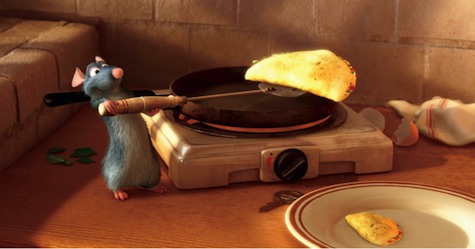It took me a moment to figure out exactly what made Ratatouille my favorite Pixar film. Sure, the conceit of an anthropomorphic rat whose great desire is to be a Parisian gourmet chef is darling, and I love to cook, but this is Pixar here. About half of their films have brought me to tears… and Ratatouille isn’t even one of those. Actually, Ratatouille sort of makes me want to dance after I watch it, or maybe sing, or compose sonnets in pig latin.
And then the obvious hit me: Ratatouille is the only Pixar film that is simply about art. About being an artist, developing as a creative force, and discovering your life’s passion.
And about exactly how painful it can be to allow yourself that.
Perhaps that central theme isn’t quite so obvious at the beginning because the main character, Remy, doesn’t want to be a painter or an actor. But creating delicious food is undoubtedly an art, one that the chefs of France dominated for centuries. Where better to set this tale than the shining city of Paris? (Don’t pronounce the “s,” we’re French now.)
We begin with Remy’s journey, one that starts completely by accident—or he might have tempted fate, if we’re being perfectly fair. Like most true artistic beings, the rat is incapable of ignoring his calling, entering the kitchen in the house where his colony resides to sample different delicacies that humans enjoy. There, he learns of a kindred spirit: the jolly, pink-faced culinary demi-god, Auguste Gusteau. After getting the colony evicted—by an old woman with a shotgun, such a cheeky little shout-out to that old trope—Remy is separated from his family and finds himself in Paris. He’s also saddled with a figment of Gusteau, one who gives him advice and directs him toward his destiny.
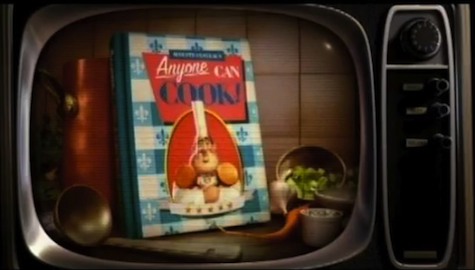
And how many of us have done that, in our own way? Imagined our heroes observing and critiquing our work, whispering in our ears and nudging us onto the path of success? And don’t those little voices usually leave us once we find our internal muses, just the way Gusteau leaves Remy at the end?
Next we meet Linguini, slapstick klutz extraordinaire. Unbeknownst to him, he’s the deceased Gusteau’s rightful heir, the son that the chef never knew he had. Gusteau’s old sous chef is the one at the helm of his restaurant now, and he gives the boy a job, secretly relieved that the kid knows nothing of his paternal legacy. When Linguini almost ruins the restaurant’s soup special, it’s Remy’s time to shine. His raw talent creates something divine, but of course, Linguini has to take the credit because having a rat in your kitchen is bad news.
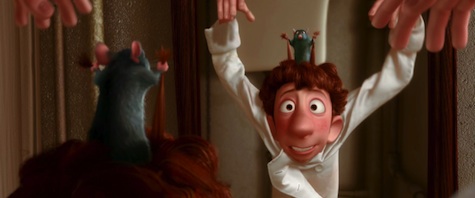
They form an adorable team once they figure out how to work together, with Remy guiding Linguini like a puppet on strings by yanking his hair. It’s all good and then better, once Remy finds out who Linguini’s dad is, and the kid inherits the restaurant for his very own. He gets the credit and the girl, Colette, and Remy is still unknown.
We see different wrong turns in the artistic journey throughout the film. Remy’s greatest roadblock is his family; ol’ dad and his brother just don’t understand how Remy could possibly see food as anything more than an essential, like shelter or water. But the young rat understands something that he can’t begin to explain to his family: that art is a force for change, that it brings unlikely people together. Despite this innate wisdom, at the beginning of the film we see Remy’s considerable abilities reduced to their lowest common denominator—he becomes the colony’s poison checker due to his keen nose. The stifling of his need to create confines and bores him until a prison break is inevitable. In some ways, Remy’s dad is even more culpable in getting the colony ousted from their home by refusing to acknowledge his son’s talents for anything more than their most practical application.
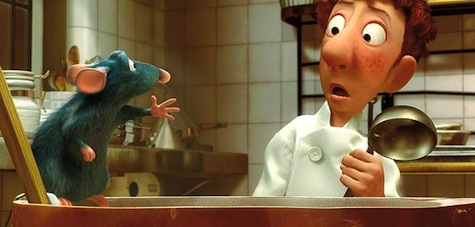
Remy then stalls out again by becoming an anonymous artist, doing the work that Linguini has to take credit for, due to his being a rat. Not having that right face to be taken seriously, being forced to hide behind a more acceptable facade, is a problem that many artists have suffered for, made worse for the fact that Linguini is Remy’s friend.
Of course, Linguini’s problem is the exact opposite of Remy’s—he’s the one who is trying to create his parent’s art. Once he finds out that he’s Gusteau’s son, his desire to be worthy of the mantle turns him into a far less lovable guy than he had been at the start. It’s hard to blame him when you know what Gusteau’s sous chef, Skinner, was doing to the family name: turning it into a brand for touting tasteless frozen food products to line his bank account. (Yet another demeaning exercise that artists often cave to for money—who likes them some Wolfgang Puck canned soup?) What Linguini fails to realize is that he has his own special calling: he’s the whiz server on rollerskates. Trying to force his abilities into the wrong box nearly costs him his friendship with Remy and Colette’s love.
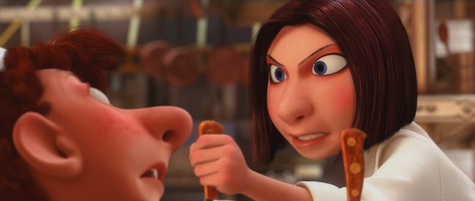
Colette is another figure struggling for her passions. The only woman in a kitchen of men, Colette is the representative for every minority told to stifle their artistic voices. She is tough as nails and skilled to boot, but her position is precarious. As an artist, she does not feel free to explore and improvise because she has to prove herself every day when others do not. And when she finds out that Linguini’s secret is a rat under his toque blanche, she fears for her career, undoubtedly worried that her affection for him blinded her to what was really happening in the kitchen. Nothing kills a woman’s chances of success so quickly as being deemed “lovesick,” after all.
Linguini’s five-star dad—Gusteau himself—suffered as an artist, and that suffering cost him his life. But what ruined the great chef is perhaps even more insidious than what Remy or Linguini are forced to endure: Gusteau was destroyed by criticism, literally and figuratively. The dreaded food critic, Anton Ego, gave the chef’s restaurant a bad review, costing Gusteau’s a Michelin Star and depressing the chef to his eventual death. Importantly, it was not merely a difference in opinion over food that earned Gusteau the critic’s ire, but a difference in opinion over art; Auguste’s motto is quite simple—Anyone Can Cook.
It’s a beautiful sentiment, isn’t it? But it’s one that Anton Ego did not hold with, and he made it his mission to rid the world of it.
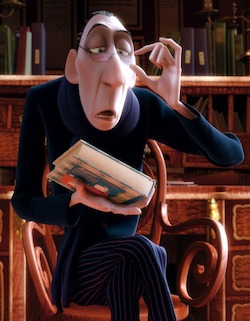
The fear of criticism and, indeed, of the critic, is central to the life of an artist. Creating art is a deeply personal act, but by virtue of creating, you are setting yourself up to be judged at every juncture. Ratatouille addresses that fear and shows us ways to overcome it. There are some who believe that critics hold too much power, and others who believe their words should be ignored, still it changes nothing; Anton Ego is here to stay. What the film wants us to remember is that criticism can be of value if it’s tempered by a respect for what artists accomplish day to day. (Ego is clearly lacking in that last bit, his surname being the clue-in.)
In the end, everyone’s roadblocks are lifted: Colette gets the respect she deserves in the kitchen once Linguini takes control of the restaurant, Linguini gains some humility and discovers that his real abilities lie in the serving trade, and Remy’s family finally learns to support his love cooking and higher knowledge. Remy continues to be the educated, philosophical member of his family, but this time with his father’s blessing.
The transmutative power of art is the victory blow of the film; Anton Ego, determined to sweep Gusteau’s under the rug yet again, is disarmed and ultimately undone when they serve him ratatouille… which sends him thinking back to his mother’s kitchen, a place where he felt soothed and loved as a child. This positive turnaround costs him his credibility as a critic, but he invests in Linguini and Remy’s new restaurant, and seems much happier for having embraced a newfound enjoyment of art and life in general. In the final moments of the film, when Linguini asks him what he wants for dessert from the tiny chef, his response is “Surprise me!”—a rallying cry to anyone who creates. It speaks of the true pact between art and criticism: the two can co-exist provided that the critic agrees to defend imagination and keep an open mind.
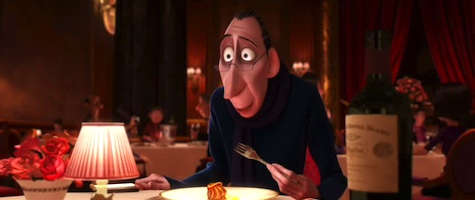
And in Ego’s final review of Gusteau’s restaurant, we find that he and the late chef have reached an understanding. Anton admits that he had misunderstood Auguste’s motto: saying “anyone” can cook does not mean everyone can cook… but it does mean that great cooks can come from anywhere. That, more than anything, everyone should be allowed to cook.
That is the empowering, imperative message of Ratatouille. Everyone is not an artist, but anyone could be an artist. Because, as living creatures, it is simply what we do.
Okay. I guess the movie did make me cry. Time to get a bottle of bordeaux and toast our glorious collective imagination.
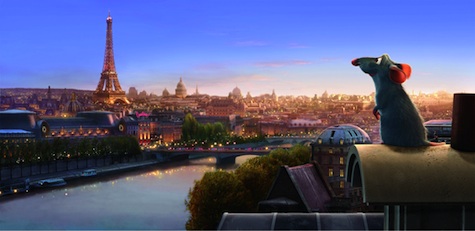
Emmet Asher-Perrin misses Paris. She definitely believes that anyone can cook. You can bug her on Twitter and read more of her work here and elsewhere.










